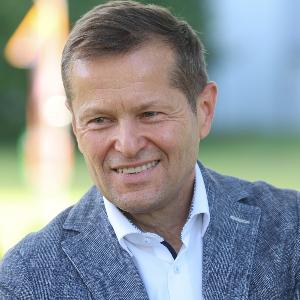Nobel Prize for LMU physicist Ferenc Krausz
3 Oct 2023
Together with two other researchers, the Chair of Experimental Physics / Laser Physics at LMU has been awarded this year’s Nobel Prize in Physics for his work on attosecond physics.
3 Oct 2023
Together with two other researchers, the Chair of Experimental Physics / Laser Physics at LMU has been awarded this year’s Nobel Prize in Physics for his work on attosecond physics.

“I can scarcely believe this is reality and not just a dream”: Nobel Prize winner Ferenc Krausz after the announcement | © picture alliance/dpa | Karl-Josef Hildenbrand
This year’s Nobel Prize in Physics has gone to Professor Ferenc Krausz, Chair of Experimental Physics / Laser Physics at LMU and Director at the Max Planck Institute of Quantum Optics in Garching. He is receiving the award together with Anne L’Huillier from Lund University in Sweden and Pierre Agostini from Ohio State University in the United States. The three researchers are being recognized for experimental methods to create attosecond pulses of light which make it possible to investigate the behavior of electrons in atoms and molecules.
“I can scarcely believe this is reality and not just a dream,” said Krausz on Tuesday shortly after the announcement. “I feel so overwhelmed. It’s truly humbling to receive such an award. But it’s also a wonderful feeling to be rewarded in this way, especially after some of the setbacks along the way.” It goes to show, he continued, that it’s worth holding fast and not losing faith in one’s research, particularly when one has the good fortune to work at excellent institutions such as LMU and the Max Planck Institute, which offer ideal conditions for research.
Prof. Ferenc Krausz is considered one of the founders of attosecond physics (1 attosecond = 10-18 seconds). Using these ultrashort laser pulses, scientists can accomplish tasks such as tracking the movements of individual electrons in the microcosmos and so obtaining insights into their behavior in atoms, molecules, and solids. These movements are set in train through the interaction of electrons with light. In the process, the light waves exert a force on the electrons which changes its strength and direction within a few hundred attoseconds. The electrons respond to these extremely rapid changes and adapt their velocity and position on the same, unimaginably short timescale. Such techniques could pave the way for the development of faster electronic components in the future.
With the contributions of other scientists and teams, his research has managed to “track in real time the fastest processes that exist in nature outside of the atomic nucleus, namely the motion of electrons,” said LMU physicist Krausz at an event in Garching not long after the Nobel committee’s decision was announced. “These movements initiate all molecular processes in living organisms and are ultimately responsible for the development of diseases at the most fundamental level.”
Ferenc Krausz has also applied attosecond pulse approaches to the field of medical diagnostics. This has made it possible to identify specific molecules in blood, for example, and it is hoped this capability will permit the early identification of certain types of cancer.
“LMU and I myself personally are delighted about the awarding of the Nobel Prize in Physics to Prof. Krausz and extend our warmest congratulations to him. This is an extraordinary recognition of his outstanding research results,” says LMU President Prof. Dr. Dr. h.c. Bernd Huber.
“The light of research is shining out from Bavaria into the world today with special brightness: I applaud Professor Krausz and his research team! The generation and measurement of light pulses of less than a femtosecond’s duration is a groundbreaking achievement that renders the world of the extremely small that much more comprehensible,” says State Minister for Science Markus Blume. “Bavaria is a world-class center of scientific research. This Nobel Prize has the effect of broadcasting the outstanding research conditions in our region to an international audience.”
“Fantastic news! On behalf of Ferenc Krausz’s colleagues in the Faculty of Physics, I would like to express our wholehearted congratulations. A richly deserved, perhaps secretly anticipated at times, and yet, when it came to it, delightfully unexpected award for a fundamental contribution to our understanding of ultrashort processes on the smallest of scales,” says Professor Ralf Bender, Dean of the Faculty of Physics.
For further information on the the research activities of Prof. Ferenc Krausz.
Further information about Nobel Prizes at LMU